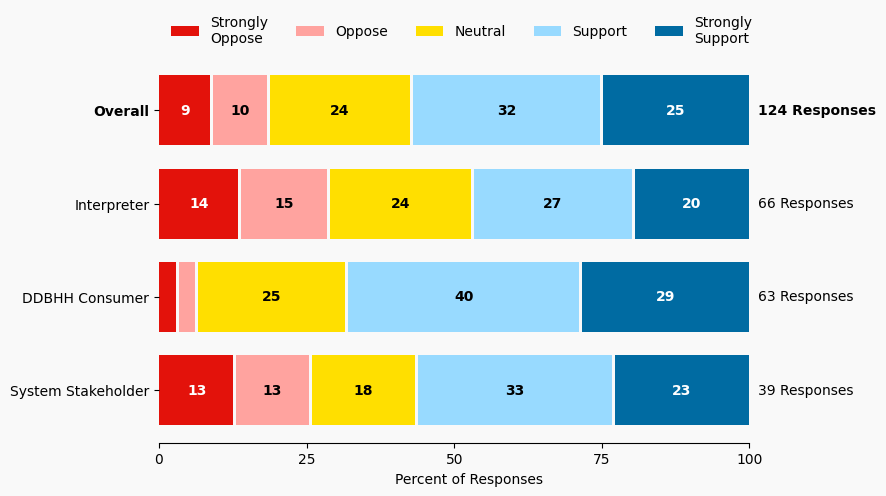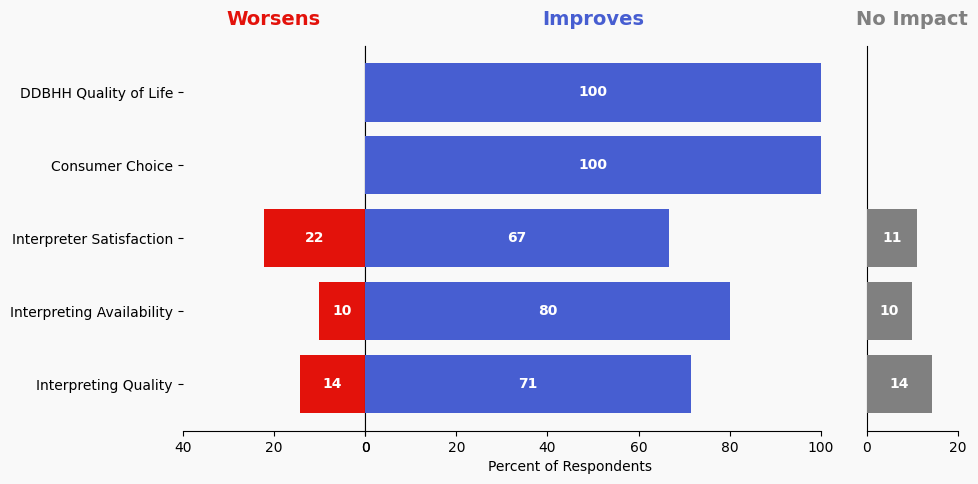37 Interpreters and Interpreter Referral Companies Donate 3% of Revenue or Provide Pro Bono Interpreting
Issue: There are interpreting needs that are not currently covered by the ADA, such as for small businesses or community organizations for which paying for interpreters would be an undue hardship. Another applicable situation is when the deaf, deafblind and hard of hearing consumers themselves become the host, such as for a wedding or personal gathering.
Proposed Solution: MRID entertain a motion at the fall business meeting to establish a 3% Club in partnership with organizations, such as Deaf Equity or Minnesota DeafBlind Association (MDBA). Establish a fund to cover interpreting needs. Additionally, if there is enough funding, funds could also be used to support interpreter initiatives such as scholarships for interpreters. Interpreters – and interpreter referral companies – in Minnesota commit to 3% of their income or 30 hours of volunteered pro bono interpreting hours annually. Update the publicly published list on a monthly basis, based on 3% received by the fund or pro bono interpreter hours delivered. Interpreters in the 3% Club can market themselves as being part of the 3% Club.
Expected outcome: A tangible fund and mechanism could be established that is intended to recognize and foster the reciprocal and interrelated nature of ASL interpreting and the communities served by interpreters. Deaf, DeafBlind and hard of hearing people could receive additional interpreting services.
Who is impacted: Consumers, interpreters
Timeline: 6 months

Summary of Support Image Description
The stacked bar charts show how respondents rated their level of support and the total number of responses. The percentage for the five support levels is shown from left to right: Strongly Oppose (Dark Red), Oppose (Light Red), Neutral (Yellow), Support (Light Blue), and Strongly Support (Dark Blue).
Respondents may identify with multiple subgroups. The overall level of support is:
Overall
Strongly Oppose: 9%
Oppose: 10%
Neutral: 24%
Support: 32%
Strongly Support: 25%
Click to see the detailed image description for each subgroup.
Interpreter
Strongly Oppose: 14%
Oppose: 15%
Neutral: 24%
Support: 27%
Strongly Support: 20%
DDBHH Consumer
Strongly Oppose: 3%
Oppose: 3%
Neutral: 25%
Support: 40%
Strongly Support: 28%
System Stakeholder
Strongly Oppose: 13%
Oppose: 13%
Neutral: 18%
Support: 33%
Strongly Support: 23%
Overview of Respondents Opting for In-Depth Solution Analysis
After indicating their support level, 5% of the 124 respondents opted in to further assess whether the solution would worsen or improve on five metrics. Of the opt-in reviewers (7 respondents), 42% supported the solution, 14% were neutral on the solution, and 42% opposed the solution.
The remaining 117 respondents did not opt in to further assess the solution. Of these people, 58% support the solution, 24% were neutral on the solution, and 17% opposed the solution.
Reviewer Evaluation of Solution Effectiveness

Solution Effectiveness Image Description
The stacked bar charts show how respondents assessed the effectiveness of this solution based on five metrics. For each metric, the percentage of respondents is shown from left to right: Worsens (Red), Improves (Blue), No Impact (Gray).
DDBHH Quality of Life
Makes It Worse 0%
Makes It Better 100%
No Impact 0%
Interpreter Satisfaction
Makes It Worse 22%
Makes It Better 66%
No Impact 11%
Consumer Choice
Makes It Worse 0%
Makes It Better 100%
No Impact 0%
Interpreting Availability
Makes It Worse 10%
Makes It Better 80%
No Impact 10%
Interpreting Quality
Makes It Worse 14%
Makes It Better 71%
No Impact 14%
Reviewer Feedback and Insights
Interpreter
Comments from Interpreters express concerns that a 3% revenue donation may be too high and could conflict with existing ficial obligations. One comment questions the fairness of mandating this policy for interpreters.
Deaf, DeafBlind, Hard of Hearing
Comments from DDBHH Consumers raise concerns about whether the recommendation is more about fundraising than community building and question the feasibility of tracking pro bono work effectively. One comment suggests a Deaf nonprofit to act as a fiscal agent and exploring scholarship and investment options to provide flexible support for interpreters.
System Stakeholder
Comments from System stakeholders suggest that tracking and enforcing the policy may be difficult, and there are concerns about the impact on interpreter agencies’ ficial health. One comment suggests pursuing grants, while others propose using flexible ficial tools like scholarships or stocks to sustain support for interpreters.
PREVIOUS SOLUTION
36 Centralize Information about Community Gatherings
Issue: Information about social gatherings for interpreters and DDBHH community members is spread out. Not all people know where to find opportunities for social gatherings.
NEXT SOLUTION
38 Host Semi-Annual DDBHH & Interpreter Community Forums on Interpreting Topics
Issue: There are no current venues for developing shared understanding about interpreting issues amongst DDBHH community members and Deaf and hearing interpreters.
Leave a Reply